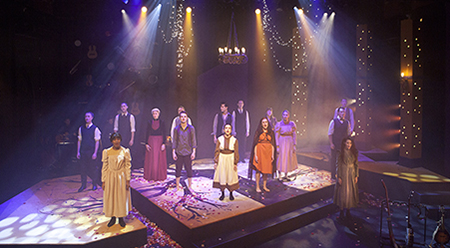 Spring Awakening opens with Wendla, a gentle slink on the forest floor while she sings, Mama Who Bore Me. What’s painted on the main platform of the set isn’t a representation of trees, but the shadows they cast – a silhouette of a trunk with branches curving off it. Like the close-knit classroom and wider community featured during the show, there is darkness here and those black tendrils run deep.
Spring Awakening opens with Wendla, a gentle slink on the forest floor while she sings, Mama Who Bore Me. What’s painted on the main platform of the set isn’t a representation of trees, but the shadows they cast – a silhouette of a trunk with branches curving off it. Like the close-knit classroom and wider community featured during the show, there is darkness here and those black tendrils run deep.
It starts before this, really, actors moving into place as the audience find their seats. The cast turn out to be more involved than you’d expect, picking up instruments to accompany the music for numbers throughout the show. There’s some fun arrangements, such as the boy-band-in-a-row shenanigans of The Bitch of Living, while The Dark I Know Well stunned as the character of Martha growled in a spotlight, while playing bass guitar.
A quality of rock is rebellion, so it makes sense to bring the making of that sound more into the company. What’s nice about these moments is how organic they feel and that none of this come at the expense of telling the story.
Brent Trotter was a stand-out in his role as Moritz, navigating a difficult emotional journey for the audience in a coherent and compelling way. Suicide is a complicated issue out in the real world, and trying to stage this sort of subject comes with challenges, particularly in terms of tone. There’s no doubt Moritz is despairing. Rejected from school, spurned by his family, so many things are out of his control.
However, the gun in his hand is something he can control. Brent tells this tragic story very well, one completed with some lovely work from Barry Mitchell, playing Moritz’s father, Herr Stiefel. While Barry plays many roles in the show, his most memorable comes here, a father standing at his son’s grave, stoic at first before crumbling under the true nature and magnitude of his grief.
Olivia Solomons did lovely work in her many roles. German accents were enjoyable to hear in this production and were something Olivia did notably well, whether it was Frau Bergmann’s (Wendla’s mother) stern demeanour, or Fräulein Knuppeldick’s cartoon malevolence.
Ashley Roussety was exceptional as Melchior. To be sure, Melchior’s story is helped immensely in this version with Director, Robbie Carmellotti, choosing to eliminate any concerns about consent in the sex scene between Melchior and Wendla. Certainly, previous productions have made Melchior’s actions in that scene appear uglier, however, it’s not too difficult to argue it’s easier to ask the audience to engage with a character who’s not a rapist.
That said, an earlier scene between Melchior and Wendla, as he hits her with a switch as her request, didn’t really work. Melchior’s transition from tentative contact to snapping and using his fists was too quick, and needed more time and to be more visceral.
Wendla’s story has no shortage of qualities we associate with adolescence. Curiosity, fear, sexual discovery, anger, love – this turbulence is at the heart of the show and Jessie-Lou Yates handles this in fine fashion with a beautiful performance as Wendla.
Indeed, by the final number, with the cast laying the seeds of a hopeful future with The Song of Purple Summer, you understand that one of the strongest qualities of StageArt’s Spring Awakening is heart. There are plenty of moments where it grabs you and you think it might never let go.
Spring Awakening
Chapel Off Chapel, 12 Little Chapel Street, Prahran
Performance: Saturday 20 May 2017 – 7.30pm
Season continues to 10 June 2017
Bookings: www.chapeloffchapel.com.au
For more information, visit: www.stageart.com.au for details.
Image: Spring Awakening – photo by Belinda Strodder
Review: David Collins
